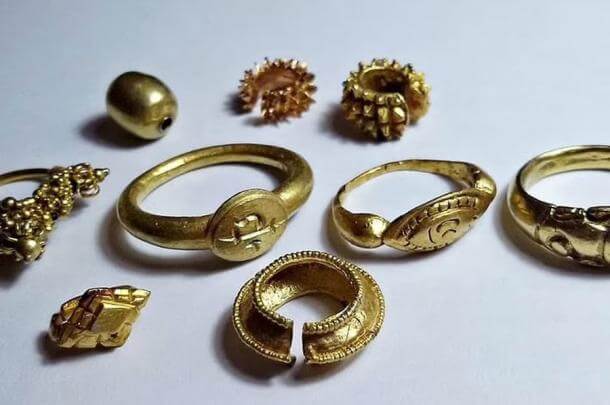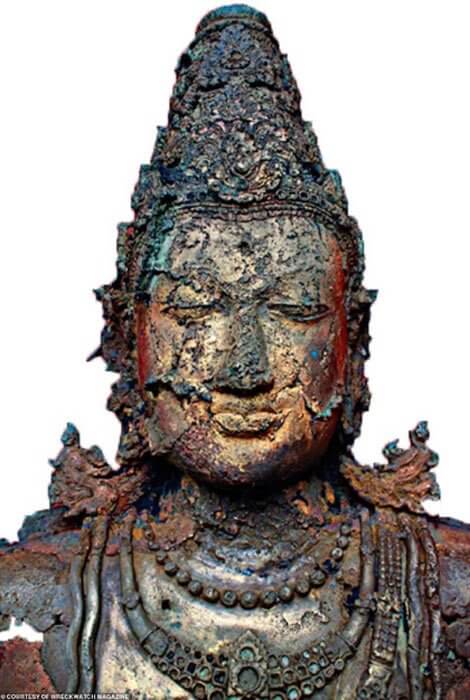
The legendary Indonesian island of gold has been found! Maybe...
 01. 11. 2021
01. 11. 2021

On the island of Sumatra, an ancient treasure worth up to several tens of millions of crowns has been found several times in the last 5 years. Are or are these treasures the remnants of the long-lost kingdom of Srivijaya, the legendary kingdom known as the Island of Gold?
Srivijaya Empire
The Srivijaya Empire flourished between the 7th and 13th centuries in present-day Indonesia. The kingdom was located around Palembang, on the volcanic island of Sumatra, west of Java. The locals say that the extraordinarily rich capital of the Srivijaya empire existed and eventually "disappeared" in the late 14th century. According to an article in The Guardian, ancient Srivijaya was associated with a vast wealth of gold and precious stones, and many people lost their lives precisely because of the mythical treasure. Is it possible that Sumatran fishermen plundered the legendary lost Island of Gold and sold its ancient treasures on the international black market?

A load of gold rings, which could be proof that Palembang is the place where the legendary Island of Gold is located.
Fishermen - conquerors of the Golden Island?
While the lost city of gold, El Dorado, remains hidden in Colombia, the main site of the Srivijaya empire may have finally been found. However, not by a team of intrepid archaeologists, but by local fishermen diving on the Musi River. Illegal treasure hunts have made many fishermen happy. Their findings included countless pieces of jewelry and a rare life-size Buddhist statue from the 8th century. The statue is studded with precious gems, valued at millions of dollars.

A life-size bronze Buddhist statue studded with precious gems pulled by fishermen into the Musi River. Could this invaluable artifact lead archaeologists to the long-lost Island of Gold?
The upcoming Srivijaya study will be part of a 180-page publication focusing on China's history and the Maritime Silk Road. The Srivijaya Maritime Empire controlled the arteries of the Naval Silk Road, which were colossal markets of the 8th century that traded in local, Chinese, and Arab goods. For more than 300 years, Srivijay's rulers controlled the trade route between the Middle East and imperial China, leading to what Kingsley described as "colossal wealth."
And what was part of the treasure?
The treasure included bronze and gold sword handles, mirrors, Buddhist figurines, bronze temple knockers, figures from Buddhist mythology, and monk bells. Furthermore, piles of gold rings with elaborate symbols and also rubies. Many of the gold ceremonial rings were fitted with a four-pointed vajra scepter - a Hindu symbol of lightning, a favorite weapon of the gods.
Until illegal diving was under the control of Dr. Kingsley, it was possible to dive and literally discover an ancient treasure. The fisherman could thus come to the world's wealth if he subsequently sold the artifacts on the black market. It's scary that most of the artifacts have probably already been sold to dubious antique dealers. This means that the evidence regarding the rise, glory and fall of Srivijaya "is dying again without speaking," explained Dr. Kingsley. The real reasons that led to the collapse of the Srivijayan Empire are not yet clear, but Dr. Kingsley speculates that it may have been an "Asian equivalent of Pompeii." another possibility could be an increase in the water level and subsequent flooding.
Esene Suenee Universe
Kitty Ferguson: Stephen Hawking, Life and His Work
The book provides a colorful picture of Hawking's childhood, the heartbreaking beginnings of his struggle with motor neuron damage during his first year of graduate study at Cambridge, growing international fame, and years of personal struggle for survival and scientific understanding of the universe. It also continuously summarizes and explains to the layman the scientific theories that Hawking dealt with.





 1
1
